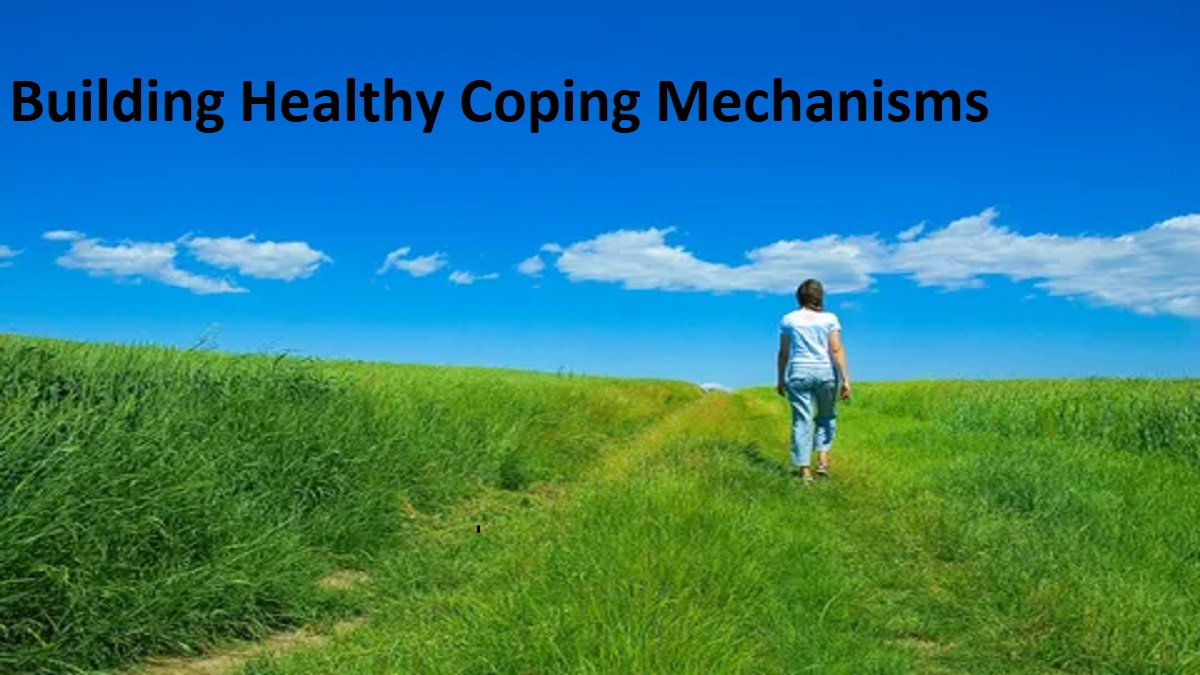Greetings! I’m delighted to share my journey in building healthy coping mechanisms that promote resilience and emotional well-being. Throughout my own experiences, I have discovered valuable strategies that have empowered me to navigate life’s challenges with grace and lead a more fulfilling life. Building Healthy Coping Mechanisms
Key Takeaways:
- Developing healthy coping mechanisms can promote resilience and emotional well-being.
- Understanding coping mechanisms helps us navigate stress and challenges more effectively.
- Awareness of unhealthy coping mechanisms allows us to replace them with healthier alternatives.
- Identifying personal triggers enhances self-awareness for managing stress. Building Healthy Coping Mechanisms
- A supportive network of loved ones plays a crucial role in building healthy coping mechanisms.
Understanding Coping Mechanisms
To effectively build healthy coping mechanisms, it is essential to first understand what coping mechanisms are and how they function. Coping mechanisms are the strategies and behaviors we employ to manage stress and navigate challenging situations. They play a significant role in stress management and overall well-being. Building Healthy Coping Mechanisms
By gaining a clear understanding of coping mechanisms and their purpose, we can cultivate the knowledge and skills necessary to develop effective strategies. These strategies can help us better cope with stress and enhance our ability to handle various situations. Building Healthy Coping Mechanisms
What Are Coping Mechanisms?
Coping mechanisms refer to how individuals deal with and adapt to stressors or difficult circumstances. They are the conscious or unconscious strategies we employ to regulate our emotions and navigate challenging situations. Coping mechanisms can be both healthy and unhealthy, depending on their impact on our well-being.
Healthy coping mechanisms promote resilience and emotional well-being, while unhealthy coping mechanisms may provide temporary relief but can harm our long-term well-being.
The Role of Coping Mechanisms in Managing Stress
Coping mechanisms play a crucial role in managing stress and promoting overall well-being. They allow us to regulate our emotions, reduce anxiety, and maintain a sense of control in challenging situations. By adopting healthy coping mechanisms, we can effectively manage stress and prevent it from overwhelming us. Building Healthy Coping Mechanisms
Effective stress management not only improves our mental and emotional health but also has a positive impact on our physical well-being.
Developing Effective Coping Mechanisms
Developing effective coping mechanisms is a personal and ongoing process. By understanding our individual needs, strengths, and preferences, we can tailor coping strategies that work best for us. It is important to remember that what works for one person may not work for another, as we all have unique experiences and perspectives.
Through self-reflection and experimentation, we can identify coping mechanisms that promote our well-being and help us navigate stress more effectively. This may include strategies such as practicing mindfulness, engaging in physical activity, seeking social support, or pursuing creative outlets. Building Healthy Coping Mechanisms
By developing a toolkit of healthy coping mechanisms, we can enhance our ability to manage stress, build resilience, and lead a more balanced and fulfilling life.
Recognizing Unhealthy Coping Mechanisms
Not all coping mechanisms are healthy or beneficial. Some can be detrimental to our well-being and hinder our ability to effectively navigate life’s challenges. In this section, I will explore common unhealthy coping mechanisms that we should avoid, along with the negative habits associated with them. By recognizing these negative patterns, we can consciously work towards replacing them with healthier alternatives, ultimately promoting our emotional resilience and well-being. Building Healthy Coping Mechanisms
Unhealthy Coping Mechanisms to Avoid

When faced with stress or difficult situations, it’s tempting to resort to unhealthy coping mechanisms as a means of escape or temporary relief. However, these habits can lead to more harm than good in the long run. Here are some common unhealthy coping mechanisms to be aware of:
- Substance abuse: Turning to drugs or alcohol as a way to cope with stress can have severe physical, emotional, and social consequences. Building Healthy Coping Mechanisms
- Emotional eating: Using food to soothe or distract from negative emotions can contribute to unhealthy eating habits and weight gain. Building Healthy Coping Mechanisms
- Isolation: Withdrawing from social interactions and cutting off support networks can leave us feeling isolated and vulnerable. Building Healthy Coping Mechanisms
- Excessive screen time: Spending excessive amounts of time on screens, such as computers, smartphones, and televisions, can lead to a sedentary lifestyle and hinder our ability to address underlying issues. Building Healthy Coping Mechanisms
- Denial: Ignoring or suppressing emotions, rather than facing them head-on, can prevent true healing and growth. Building Healthy Coping Mechanisms
The Cycle of Unhealthy Coping
Engaging in unhealthy coping mechanisms may provide temporary relief, but they often perpetuate a cycle that keeps us trapped in negative patterns. By recognizing the negative habits associated with these coping mechanisms, we can break free from this cycle and pave the way for healthier alternatives. Building Healthy Coping Mechanisms
Unhealthy coping mechanisms are like a Band-Aid on a wound that requires stitches. They may temporarily cover up the pain, but they don’t address the underlying issue.
The Impact on Well-being
Continuing to rely on unhealthy coping mechanisms can take a toll on our overall well-being. These negative habits can lead to increased stress, decreased resilience, and hindered personal growth. By acknowledging the impact of these behaviors, we can take the necessary steps to replace them with healthier coping strategies. Building Healthy Coping Mechanisms
Unhealthy Coping Mechanisms vs. Healthy Alternatives
| Unhealthy Coping Mechanisms | Healthy Alternatives |
|---|---|
| Substance abuse | Engaging in physical activities or hobbies as a form of stress relief |
| Emotional eating | Expressing emotions through journaling or talking to a trusted friend |
| Isolation | Seeking support from loved ones and engaging in social activities |
| Excessive screen time | Practicing mindfulness or engaging in outdoor activities |
| Denial | Seeking therapy or counseling to explore and address underlying issues |
By consciously working towards replacing unhealthy coping mechanisms with healthier alternatives, we can nurture our emotional well-being and build a foundation of resilience that empowers us to face life’s challenges with strength and grace. Building Healthy Coping Mechanisms
Identifying Personal Triggers

Understanding our triggers is crucial for building healthy coping mechanisms. These triggers are unique to each individual and can vary from person to person. By identifying our triggers, we can develop self-awareness and gain a deeper understanding of how certain situations or experiences can affect us. Building Healthy Coping Mechanisms
Triggers can manifest in various ways, such as specific events, thoughts, memories, or even physical sensations. They have the power to elicit emotional and physiological reactions, which may lead to stress, anxiety, or other negative emotions. By pinpointing these triggers, we can take proactive steps to manage and respond to them in healthier ways.
Identifying personal triggers requires self-reflection and introspection. It involves paying close attention to our thoughts, emotions, and physical sensations in different situations. Here are a few strategies that can help in this process:
- Mindfulness: Practice being fully present in the moment and observe your thoughts and emotions without judgment. Mindfulness can help you become more aware of your triggers and how they impact you. Building Healthy Coping Mechanisms
- Journaling: Keep a journal to record your thoughts, feelings, and experiences. This can help you identify patterns and triggers that may arise in certain situations.
- Self-reflection: Take time to reflect on your past experiences and consider the emotions or reactions they elicited. This reflection can provide valuable insights into your triggers.
- Seeking feedback: Talk to trusted friends or family members who can provide an outside perspective on your behavior and emotional responses. They may be able to help you identify triggers that you may not be aware of. Building Healthy Coping Mechanisms
Self-awareness plays a crucial role in identifying triggers. It allows us to connect with our emotions and understand how they influence our thoughts and behaviors. By developing self-awareness, we can take control of our responses and make conscious choices to build healthier coping mechanisms. Building Healthy Coping Mechanisms
Once you have identified your triggers, it is essential to find healthy coping mechanisms that work for you. In the next section, we will explore strategies to help you develop effective ways to manage and respond to your triggers, promoting resilience and emotional well-being. Building Healthy Coping Mechanisms
Building a Supportive Network
When it comes to building healthy coping mechanisms, having a strong support system is essential. Positive relationships and support from loved ones can make a world of difference during challenging times. By nurturing these connections and seeking support, we can find comfort and encouragement to navigate life’s obstacles.
Building a support system involves surrounding yourself with individuals who genuinely care about your well-being. These relationships provide an invaluable source of emotional support, empathy, and understanding. They are the people who will uplift you, offer guidance, and be there for you when you need them most.
“Surround yourself with only people who are going to lift you higher.” – Oprah Winfrey
Seeking support from loved ones
Your loved ones can be your rock and your sounding board. By confiding in them and sharing your struggles, you create a safe space to express your emotions and thoughts. They can offer a fresh perspective, provide advice, or simply lend an empathetic ear. Recognize that it’s okay to lean on others for support, as we all need it from time to time.
A supportive network not only provides emotional comfort but can also offer practical help. Whether it’s a helping hand with tasks, a shoulder to cry on, or words of encouragement, their presence can make a significant impact on your well-being. Building Healthy Coping Mechanisms
Building new connections
While your existing relationships provide a solid foundation, actively seeking new connections can also enrich your support system. Consider joining social or interest-based groups where you can meet like-minded individuals who share your values or interests. These new connections can provide fresh perspectives, diverse experiences, and even unique coping strategies that you may not have considered before.
The power of online communities
In today’s digital age, online communities can also play a vital role in building a supportive network. Whether it’s joining forums, social media groups, or online support groups, these platforms provide a space for individuals going through similar challenges to connect and support one another. Online communities can offer a sense of belonging and understanding, even when physical proximity may not be possible.
| Benefits of a Supportive Network | Examples |
|---|---|
| Emotional support | Comforting words, empathetic listening |
| Practical help | Assistance with daily tasks, offering a helping hand |
| Diverse perspectives | Unique insights, alternative coping strategies |
| Motivation and encouragement | Words of affirmation, uplifting conversations |
In summary, building a supportive network is crucial for developing healthy coping mechanisms. Surrounding ourselves with positive relationships and seeking support from loved ones can provide emotional comfort, practical assistance, diverse perspectives, and the motivation we need to overcome challenges. Together, we can navigate life’s ups and downs with increased resilience and well-being.
Practicing Self-Care

When it comes to building healthy coping mechanisms, taking care of ourselves is paramount. Self-care routines play a crucial role in enhancing our emotional well-being and resilience. By prioritizing self-care, we can nurture ourselves and better navigate life’s challenges. Building Healthy Coping Mechanisms
Self-care is about intentionally setting aside time and energy to meet our own needs. It involves practices that promote relaxation, rejuvenation, and self-reflection. By incorporating self-care into our daily lives, we can replenish our emotional reserves and foster a sense of inner peace. Building Healthy Coping Mechanisms
Why Self-Care Matters
Engaging in regular self-care routines has numerous benefits. It allows us to recharge and reduce stress levels, improving our overall well-being. Self-care also enhances our ability to manage emotions and cope with difficult situations effectively. By taking care of ourselves, we become better equipped to face life’s challenges with resilience.
Additionally, self-care routines can help prevent burnout and promote a healthy work-life balance. By making self-care a priority, we prioritize our own needs and create space for self-reflection, personal growth, and self-discovery.
Tips for Incorporating Self-Care
Integrating self-care into our routines doesn’t have to be complicated or time-consuming. Here are some practical tips to help you incorporate self-care into your daily life:
- Schedule dedicated self-care time: Set aside specific time slots in your day for self-care activities. Treat this time as non-negotiable, just like any other appointment.
- Engage in activities you enjoy: Take part in activities that bring you joy and relaxation, whether it’s reading a book, practicing yoga, or taking a soothing bath. Find what resonates with you and prioritize it. Building Healthy Coping Mechanisms
- Practice mindfulness: Mindfulness allows you to be fully present in the moment, promoting calmness and reducing stress. Find moments throughout the day to practice mindfulness, such as focusing on your breath or engaging in a quick meditation. Building Healthy Coping Mechanisms
- Nurture your physical health: Take care of your body by engaging in regular exercise, eating nutritious food, and getting enough sleep. Physical well-being is closely linked to emotional well-being. Building Healthy Coping Mechanisms
- Set boundaries: Learn to say no to commitments that overload your schedule or drain your energy. Create boundaries that prioritize your well-being and protect your time and energy. Building Healthy Coping Mechanisms
Quote:
Remember, self-care is not selfish. It is necessary for our well-being. When we take care of ourselves, we can show up fully for others.” – Oprah Winfrey
By incorporating these self-care tips into our daily lives, we can cultivate a greater sense of emotional well-being and resilience. Remember, self-care is not a luxury; it is an essential investment in ourselves.
Developing Positive Coping Strategies
Building healthy coping mechanisms involves developing positive strategies to manage stress and adversity. When faced with challenges, it is important to have effective tools at our disposal to navigate through difficult times. In this section, I will introduce various techniques that can be used as positive coping strategies, enhancing resilience and promoting overall well-being. Building Healthy Coping Mechanisms
Mindfulness
Mindfulness is a powerful practice that encourages us to focus our attention on the present moment without judgment. By cultivating mindfulness, we can increase our awareness of our thoughts, feelings, and bodily sensations, allowing us to respond to stressors with composure and clarity. Engaging in mindfulness exercises such as deep breathing, meditation, or mindful walking can help us develop a steadfast mindset and build resilience. Building Healthy Coping Mechanisms
Exercise
Physical activity is not only beneficial for our physical health but also plays a crucial role in our emotional well-being. Engaging in regular exercise releases endorphins, known as “feel-good” hormones, which alleviate stress and boost mood. Whether it’s going for a brisk walk, practicing yoga, or participating in team sports, finding an exercise routine we enjoy can significantly enhance our ability to cope with stressors. Building Healthy Coping Mechanisms
Creative Outlets
Engaging in creative outlets allows us to express ourselves and positively channel our emotions. Whether it’s painting, writing, playing a musical instrument, or dancing, these activities provide a healthy avenue for self-expression and stress relief. By immersing ourselves in a creative process, we can alleviate tension, promote relaxation, and tap into our inner strengths. Building Healthy Coping Mechanisms
Incorporating these positive coping strategies into our lives can help us build resilience and overcome challenges more effectively. By practicing mindfulness, engaging in regular exercise, and exploring creative outlets, we empower ourselves to navigate life’s ups and downs with grace and strength. Building Healthy Coping Mechanisms
Seeking Professional Support
Sometimes, building healthy coping mechanisms may require professional help. Seeking therapy or counseling can be beneficial in enhancing our journey toward emotional well-being. Professional support provides us with the guidance and tools needed to effectively cope with life’s difficulties.
The Benefits of Professional Help
The professional help provided through therapy or counseling offers numerous benefits for individuals seeking to develop healthy coping mechanisms. Some of the advantages include:
- Expertise: Therapists and counselors have extensive knowledge and experience in understanding and addressing emotional well-being. Building Healthy Coping Mechanisms
- Objective Perspective: Professionals provide an objective perspective and unbiased guidance, allowing us to gain new insights. Building Healthy Coping Mechanisms
- Tools and Strategies: Through therapy, we can learn specific tools and strategies tailored to our unique coping needs. Building Healthy Coping Mechanisms
- Emotional Support: Therapists and counselors offer a safe and non-judgmental space for us to express our emotions and concerns. Building Healthy Coping Mechanisms
- Self-Discovery: Professional help can assist us in uncovering underlying issues and discovering our strengths and potential. Building Healthy Coping Mechanisms
Incorporating therapy or counseling into our journey of building healthy coping mechanisms can bring significant positive changes to our lives.
“Seeking professional help is a brave and proactive step towards improving our well-being. It opens doors to self-discovery and equips us with valuable tools.”
Types of Professional Help
There are various types of therapy and counseling available, each catering to different needs and preferences. Some common types include:
| Therapy Type | Description |
|---|---|
| Cognitive Behavioral Therapy (CBT) | A goal-oriented approach that focuses on identifying and changing negative patterns of thinking and behavior. |
| Psychodynamic Therapy | An in-depth exploration of unconscious patterns and unresolved conflicts that may contribute to emotional difficulties. |
| Family Therapy | Involves working with the entire family unit to address relationship dynamics and improve communication. |
| Group Therapy | A supportive setting where individuals with similar struggles can come together, share experiences, and learn from one another. |
These are just a few examples of the many therapeutic approaches available. Each therapy type offers unique benefits, and it is important to find the approach that aligns with our specific needs and goals. Building Healthy Coping Mechanisms
Remember, seeking professional help is not a sign of weakness, but rather a courageous step towards self-improvement and growth. With the support and guidance of a trained professional, we can unlock our potential and develop healthier coping mechanisms. Building Healthy Coping Mechanisms
Conclusion

In this journey of building healthy coping mechanisms, I have realized the importance of self-reflection, self-care, and support. By understanding the concept of coping mechanisms and their role in managing stress, I have been able to recognize and let go of unhealthy habits that hinder my emotional well-being. Building Healthy Coping Mechanisms
Implementing positive strategies such as mindfulness, exercise, and creative outlets has enabled me to navigate life’s challenges with resilience and grace. Fostering a supportive network and seeking professional help when needed has provided me with the necessary guidance and tools to overcome difficulties. Building Healthy Coping Mechanisms
As I continue on this path of growth, I invite you to embrace these tools and build a better future for yourself. By prioritizing self-care, nurturing positive relationships, and adopting positive coping strategies, we can empower ourselves to lead more fulfilling lives and navigate the ups and downs with strength and emotional well-being.
FAQ
What are coping mechanisms?
Coping mechanisms are strategies or behaviors that individuals use to manage stress and navigate challenging situations. They can be conscious or unconscious responses to external or internal stressors. Building Healthy Coping Mechanisms
How do coping mechanisms contribute to emotional well-being?
Coping mechanisms play a vital role in promoting emotional well-being by helping individuals effectively manage stress and adversity. They provide a healthy outlet for emotions, reduce anxiety, and contribute to overall resilience. Building Healthy Coping Mechanisms
What are some examples of healthy coping mechanisms?
Healthy coping mechanisms include exercise, journaling, deep breathing exercises, practicing mindfulness, seeking support from loved ones, engaging in hobbies or creative outlets, and setting boundaries. Building Healthy Coping Mechanisms
How can I recognize unhealthy coping mechanisms?
Unhealthy coping mechanisms often manifest as harmful habits or behaviors that provide temporary relief but have long-term negative consequences. Examples include substance abuse, excessive alcohol consumption, emotional eating, and avoidance.
What steps can I take to identify my triggers?
Identifying personal triggers involves self-reflection and self-awareness. Pay attention to patterns of thoughts, emotions, and behaviors during challenging situations. Keep a journal, seek therapy, or engage in introspective activities to gain insight into your triggers. Building Healthy Coping Mechanisms
Why is having a supportive network important?
A supportive network provides emotional support, encouragement, and perspective during difficult times. It helps individuals feel understood, validated, and less alone. Building positive relationships and seeking support from loved ones fosters resilience and aids in the development of healthy coping mechanisms.
What is the role of self-care in building healthy coping mechanisms?
Self-care involves prioritizing activities that nurture and replenish your physical, mental, and emotional well-being. It helps recharge your energy, reduce stress, and enhance resilience. By incorporating self-care routines into your daily life, you can better cope with challenges and maintain overall well-being. Building Healthy Coping Mechanisms
What are some positive coping strategies I can practice?
Positive coping strategies include mindfulness and meditation, regular exercise, engaging in hobbies or creative outlets, practicing gratitude, seeking professional help, setting realistic goals, and engaging in healthy problem-solving techniques. Building Healthy Coping Mechanisms
When should I consider seeking professional support?
It is important to consider seeking professional support if your coping mechanisms are ineffective, if you are experiencing persistent distress or impairment in daily functioning, or if your emotional well-being is severely impacted. Therapists or counselors can provide guidance, tools, and support tailored to your specific needs.
